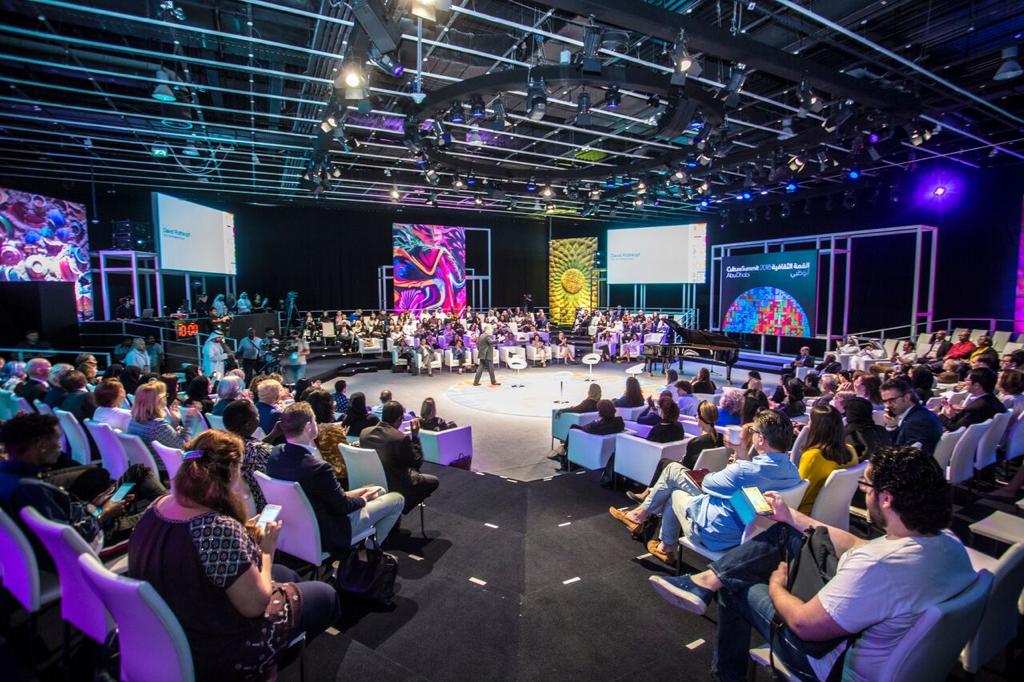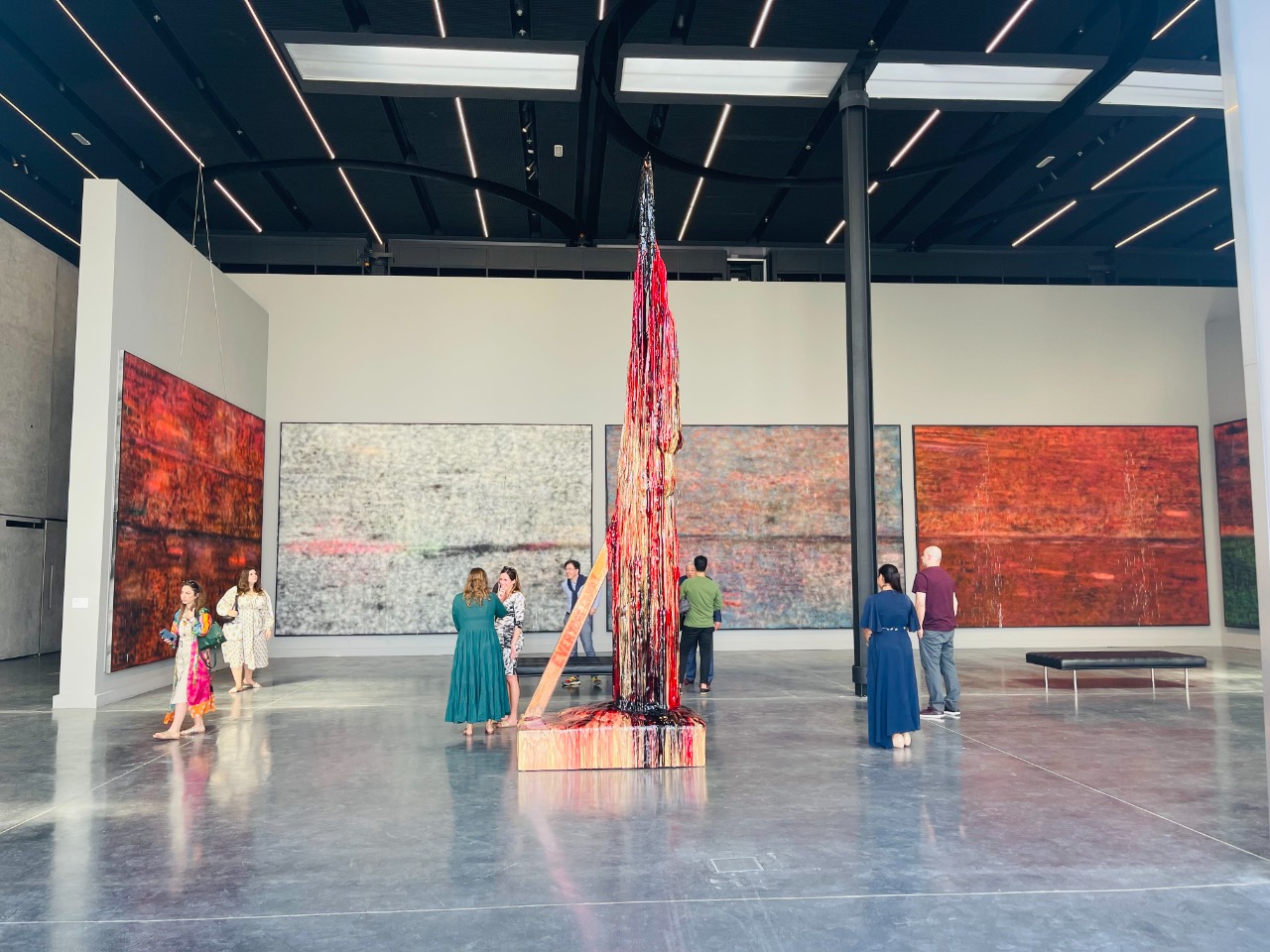Presented in collaboration with the Barjeel Art Foundation, a prominent UAE-based art initiative with an extensive collection of modern and contemporary Arab art, the exhibition brings together 50 women artists from across the Arab world whose work from the 1960s to the 1980s played an instrumental role in shaping the visual and cultural narratives of the region. Spanning generations, geographies, and movements, the exhibition shines a light on how these pioneering artists used craft, tradition, and innovation to expand the possibilities of artistic expression.

Including painting, sculpture, glass, brass, tapestry, ceramics, and mixed media, the works on display explore themes of identity, memory, place, tradition, and renewal. The myriad perspectives presented in the exhibition are shaped by distinct cultural, political, and personal contexts, offering new readings of modern Arab art history.

Born 1945, Jerusalem, Palestine
Palestinian Women at Work, 1979
Ceramic relief, 42 × 60 cm
Barjeel Art Foundation Collection, Sharjah
Some of the highlights include works by:
- Safeya Binzagr (Saudi Arabia, 1940 – 2024): a pioneering Saudi Arabian artist who was the first woman to have a solo art exhibition in Saudi Arabia.
- Mounirah Mosly (Saudi Arabia, 1954 – 2019): a Saudi Arabian plastic works artist and painter who often worked with materials like copper and palm tree fiber.
- Inji Efflatoun (Egypt, 1924–1989): a revolutionary artist and political activist whose vivid paintings speak to resistance and liberation. Her oil on canvas titled Ezba (1953) will be presented at the exhibition.
- Chaibia Talal (Morocco, 1929–2004): an icon of North African art, celebrated for her colorful, expressive works rooted in rural mythology. The artist’s 1969 oil on canvas Août will be on view.
- Susan Hefuna (Egypt/Germany, b. 1962): a multimedia artist exploring identity, urban life, and cultural hybridity. The artist will present her ink stain on wood work titled Al Sabr Gamil, dated 2007.
- Vera Tamari (Palestine, b. 1945): painter and ceramicist examining memory, loss, and homeland. A ceramic relief titled Palestinian Women at Work (1979) will be part of the exhibition.

Born 1963, Harrania, Egypt
Garden Plants, 2021
Tapestry, 110 × 150 cm

Born 1946, Tulkarm, Palestine
Letter to Homeland, undated
Textile, 110 × 120 cm

Born 1947, Ploërmel, France
Scène de Famille (Family Scene), 1967
Oil on wood panel, 72 × 92 cm
From early modernists such as painter Zeinab Abd El Hamid (Egypt, 1919–2002) and painter and tapestry artist Safia Farhat (Tunisia, 1924–2004) to contemporary voices including Mariam Al Fakhro (Bahrain, b. 1952) and Suad Al-Essa (Kuwait, b. 1943), the exhibition reflects how Arab women have actively shaped the region’s evolving artistic heritage.
“Featuring the work of 50 seminal figures, Horizon in Their Hands revisits the contributions of women artists who challenged the very definition of art,” says Rémi Homs, curator of the exhibition. “The works examine how they engaged with the boundaries between art and craft, turning this intersection into fertile ground for critical reflection. What defines fine art? Where does the line fall between utilitarian and often gendered forms of craft and individual artistic expression? And how can materiality itself become a vehicle for cultural and political commentary?” he adds.

Born 1925, Paris, France. Died 2009, Ivry-sur-Seine, France
Aquatic Dance, 1974
Tapestry, 228 × 143 cm
Barjeel Art Foundation Collection, Sharjah
“Horizon in Their Hands reflects Ithra’s aim to cultivate a thriving cultural ecosystem—one that contributes to preserving legacies, amplifying diverse voices, and inspiring dialogue between past, present, and future,” Farah Abushullaih, Head of the Ithra Museum. “Through this institutional collaboration that foregrounds underrepresented narratives in Arab art, this exhibition is set to become a milestone in Ithra’s ongoing mission of nurturing creativity and cultural dialogue across the region and beyond,” she adds.
The exhibitionwill be on view from 18 September 2025 until 14 February 2026, with ticketed access to the museum gallery available through booking on the Ithra website.

Born 1959, Rijal Almaa, Saudi Arabia
Untitled, 2019
Acrylic on wood panel, 200 × 100 cm
Collection of Jameelah Assiri

Born 1964, Harrania, Egypt
Wool Yarn Dyeing at the Centre, 2004
Tapestry, 275 × 190 cm
Barjeel Art Foundation Collection, Sharjah

Born 1919, Jerusalem, Palestine. Died 1997, Jerusalem, Palestine
Allah, undated
Glass, 30 cm diameter
Barjeel Art Foundation Collection, Sharjah
About the King Abdulaziz Center for World Culture (Ithra)
The King Abdulaziz Center for World Culture (Ithra), an initiative by Aramco, is a leading cultural destination in Dhahran, Saudi Arabia. The center focuses on enriching people’s lives by offering impactful cultural and creative programs and initiatives. Since its opening in 2018, Ithra has become a distinguished architectural landmark which houses the Idea Lab, Library, Theater, Museum, Cinema, Great Hall, Energy Exhibit, Children’s Museum and Knowledge Tower.
For more information, please visit: ithra.com. Follow Ithra on social media: Facebook (King Abdulaziz Center for World Culture), X (@Ithra) and Instagram (@Ithra) #Ithra



